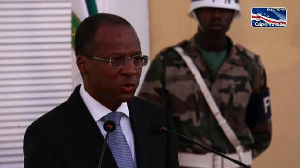
The campaign has been dominated by the Covid pandemic and its impact on a tourism-dependent economy
PRAIA, April 18 (NNN-AFRICANEWS) — Voters in Cape Verde, a bastion of democracy in Africa, go to the polls Sunday after a campaign dominated by the Covid pandemic and its impact on an economy dependent on tourism.
Prime Minister Ulisses Correia e Silva and his centre-right Movement for Democracy party are hoping for another term.
“We will not develop or finance programs to manage poverty. On the other hand, we will do everything we can for people to escape poverty thanks to jobs, production and income so that they can be independent and autonomous,” he said.
Prime Minister Ulisses Correia e Silva’s Movement for Democracy (MpD) is being closely contested by the African Party for the Independence of Cape Verde (PAICV), a socialist party led by Janira Hopffer Almada.
Almada, 42, is bidding to be the first woman prime minister of Cape Verde, a group of tropical islands with a population of some 550,000 about 600 kilometres from Senegal.
In 1990, the one-party rule in Cape Verde abandoned, leading to the first multi-party elections the following year.
In 2016, the MpD ended the PAICV’s 15-year run with a historic victory, gaining 40 out of the 72 seats in the single-chamber parliament, the National Assembly.
After a campaign marked by festive rallies, where candidates danced to music — another of Cape Verde’s internationally recognised treasures — the outcome Sunday is more than likely to be accepted serenely.
“Stability… is our oil, our diamonds,” Silva said on the sidelines of a rally in the capital Praia where clad in jeans and a polo shirt, he chatted to voters.
“For us, freedom, institutions and having checks on power are a priority… this is why we have an opposition.”
The tiny Atlantic archipelago ranks just behind Mauritius as the most democratic country in sub-Saharan Africa in the Economist Intelligence Unit’s 2020 Democracy Index.
In-office since 2016, Silva is a 58-year-old former bank executive and ex-mayor.
He was educated in Portugal, the colonial power until independence in 1975.
During his tenure, the country was not just hit by the Covid pandemic but also a three-year drought
Both major parties are pitching on measures to provide wide access to vaccination and to diversify the economy.
PAICV believes that the government did not provide sufficient and timely assistance when the pandemic began.
“Many measures were not implemented when they would have been useful…and many others did not reach the intended target,” Almada told the Portuguese news agency LUSA.
The slim lawyer, like Silva a former minister, became in 2014 the first woman and youngest person to head the PAICV.
Four smaller parties are also in the running for the election, with results expected Sunday night.
Cape Verde has a semi-parliamentary system in which the prime minister exercises executive power while the president acts as an arbitrator in case of unresolvable disputes.
Presidential elections will be held on Oct 17. — NNN-AGENCIES






